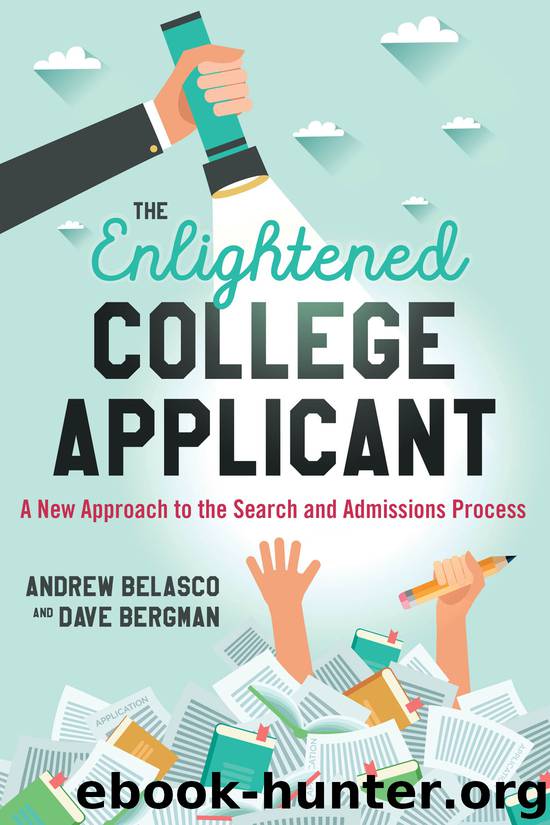The Enlightened College Applicant by Andrew Belasco & Dave Bergman

Author:Andrew Belasco & Dave Bergman
Language: eng
Format: epub
Publisher: Rowman & Littlefield Publishers
Figure 5.6 Selective and Transfer-Friendly Colleges
If a student’s prospects of getting into, say, Notre Dame out of high school are on par with Rudy Ruettiger’s at the beginning of classic sports film Rudy, their best bet may be working toward a transfer to South Bend after freshman year. Notre Dame, along with selective schools like the University of Virginia, the University of North Carolina, and Wesleyan University are all known to be consistently transfer-friendly.
2) The Less-Popular Major Maneuver
Colleges have institutional needs to consider during the admissions cycle. This can work to a student’s advantage as the following example demonstrates:
Applicants to Prestige College’s Italian program have dwindled in recent years. Applicant X took four years of Italian culminating with a high score on the AP Italian Language and Culture exam. Unfortunately, Applicant X’s SATs are in the lower quartile for accepted students at Prestige College and their overall GPA, thanks to a slow start freshman year of high school, isn’t quite up to snuff either.
Now, Applicant X wants to study business at Prestige College but knows he will likely be rejected from that program, so he considers selling his background in another interest, Italian, to get accepted. If the plan works, Applicant X could decide to transfer into the business program a semester or two after matriculating, provided he earns good grades.
Of course, the only reason such a plan would have a prayer for success is the demonstrated interest and proficiency in Italian previously shown by Applicant X. If his only stated experience with Italian was enjoying Paul Newman’s Sockarooni pasta sauce, the college would have easily sniffed out the scheme, which, not coincidentally, would have smelled like diced bell peppers and garlic.
It’s also worth noting that this strategy isn’t viable at all colleges, as not all colleges consider choice of major as a significant factor in their admissions process. Generally, larger universities with a relatively high number of majors and distinct undergraduate divisions/schools—UC Berkeley, Carnegie Mellon, and Cornell, for example—are likely to assign more emphasis to an applicant’s desired program of study.
3) Enroll in the College of General/Liberal/Continuing Studies
If a student is not opposed to living off campus, studying part-time, and/or learning among nontraditional students, this could be their ticket to a prestigious undergraduate degree. Several highly competitive colleges offer alternative undergraduate degree programs that allow students with less-than-elite credentials to benefit from the resources and brand of a topflight institution. These institutions include, among others, Columbia University’s School of General Studies, University of Pennsylvania’s College of Liberal and Professional Studies, and Harvard University’s Extension School.
Before pursuing any of these options, however, it is important to understand elite institutions distinguish between students enrolling in traditional and alternative programs, not only during their undergraduate years, but after college as well. In addition to learning about the level of access alternative students have to university faculty and facilities, it’s also important to determine whether they will have access to the same career-related services and alumni networks, and whether the degree/diploma you receive will be identical to (i.
Download
This site does not store any files on its server. We only index and link to content provided by other sites. Please contact the content providers to delete copyright contents if any and email us, we'll remove relevant links or contents immediately.
| Administration | Adult & Continuing Education |
| Business School Guides | College Guides |
| Financial Aid | Graduate School Guides |
| Law School Guides | Medical School Guides |
| Test Preparation | Vocational |
Spare by Prince Harry The Duke of Sussex(5200)
Navigation and Map Reading by K Andrew(5159)
Tuesdays with Morrie by Mitch Albom(4788)
Machine Learning at Scale with H2O by Gregory Keys | David Whiting(4314)
Cracking the GRE Premium Edition with 6 Practice Tests, 2015 (Graduate School Test Preparation) by Princeton Review(4296)
Never by Ken Follett(3960)
Goodbye Paradise(3812)
What It Really Takes to Get Into Ivy League and Other Highly Selective Colleges by Hughes Chuck(3762)
Fairy Tale by Stephen King(3401)
Harry Potter and the Prisoner of Azkaban (Book 3) by J. K. Rowling(3362)
Pledged by Alexandra Robbins(3179)
Kick Ass in College: Highest Rated "How to Study in College" Book | 77 Ninja Study Skills Tips and Career Strategies | Motivational for College Students: A Guerrilla Guide to College Success by Fox Gunnar(3131)
Reminders of Him: A Novel by Colleen Hoover(3122)
A Dictionary of Sociology by Unknown(3085)
Sapiens and Homo Deus by Yuval Noah Harari(3078)
The Social Psychology of Inequality by Unknown(3034)
Will by Will Smith(2924)
Graduate Admissions Essays, Fourth Edition: Write Your Way into the Graduate School of Your Choice (Graduate Admissions Essays: Write Your Way Into the) by Asher Donald(2923)
Zero to Make by David Lang(2786)
